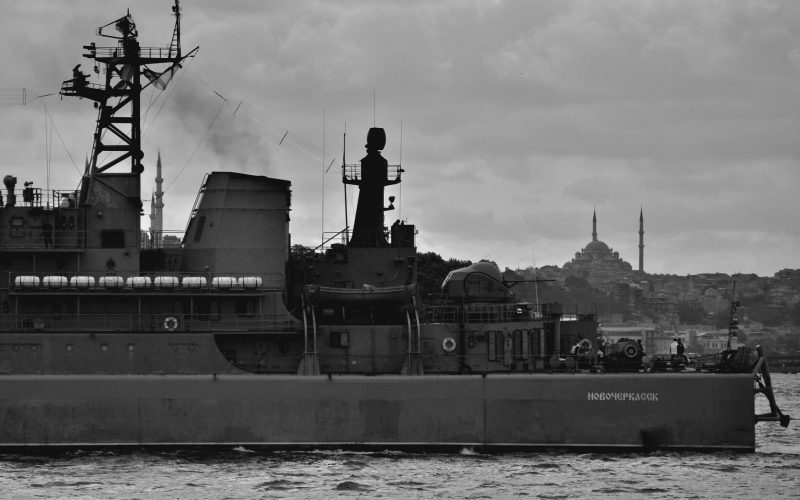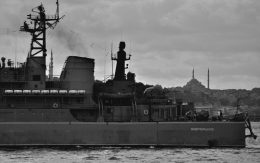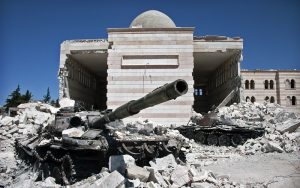Russian access to the Mediterranean has been one of the Kremlin’s foreign policy goals all along. Not coincidentally, a big conquest in this regard has been the establishment of a naval facility in the city port of Tartus in Syria, which explains also Russia’s strong pro-Assad stance. Accordingly, the agreement signed by the two parties in 2017 was a milestone as it offered Russia the possibility to exploit and expand the naval facility for 49 years, free of any charge and allowing total sovereignty on the base with a possibility to extend it for other 25 years if neither side objects it. The importance of this base lies in the fact that in this way Moscow can bypass the Turkish-controlled straits of the Dardanelles and the Bosporus as well as the Sea of Marmara and move its warships more freely in the Mediterranean, therefore avoiding the Black Sea.
Now it seems that after the war against Ukraine began two months ago, Russian sea activities are not directed only toward the Black Sea, as expected, but even more toward the Mediterranean. Accordingly, the naval base in Tartus proves to be the basic point of departure of all Russian naval activities as since February 28th passage through the Turkish straits has been denied to Russian warships. In April this year, the Eastern Mediterranean’s general situation was quite reminiscent of Cold War scenarios due to the enhanced circulation of Russian Slava class cruisers, Udaloi class destroyers, frigates, and Kilos submarines. This has obviously mobilized NATO fleets in the region with the support of the Italian and French navies as well as air forces from Greece, Italy, Turkey, and the US to put under strict control the region extending from Sicily to Cyprus. This strong Russian naval mobilization in the Eastern Aegean Sea, moving even more westward and north of Crete, is enhancing worries within NATO.
The conflict in Ukraine has emphasized the importance of this strategic area, particularly after the closure of the Turkish straits, blocking the only Russian direct way between the Mediterranean and the Black Sea. It should be noted that the kind of ships deployed in the Mediterranean, the Slava cruiser, are anti-ship platforms equipped with 16 P-1000 Vulkan supersonic missiles and an air-defense area with 64 S-300F Rif missiles. Why this display of military forces? Why now that Russia is mostly busy with the Ukrainian front?
There may be some explanations. Firstly, Russia may want to strengthen its economic presence on a piece of the sea that has traditionally been out of reach, also given the economic importance of the Aegean oil and gas wise. Despite many attempts to come closer to Greece by either exploiting the previous Anel-Syriza coalition government and its pro-Kremlin stances in 2015 or trying to propose ambitious pipeline projects, like the failed Burgas-Alexandroupoli pipeline for oil transportation from Bulgaria to Greece, pro-EU and pro-NATO stance have always prevailed. Enhancing its presence in this sea can open new economic opportunities, particularly in relation to northern African countries like Libya and Egypt, given the continuous sanctions packages issued by the EU. Secondly, and related to the first argument, Russian enhanced military presence could aim to counterbalance the traditional US presence, now even stronger not only in the Mediterranean but also in the Black Sea by proposing itself as an alternative global power. In this regard, the massive support offered to the Syrian regime stands in line with this objective, as the Kremlin cannot afford to lose the only stable basis it has enjoyed in the Mediterranean for years.
It is unknown if these actions are just mere warnings without the intention to escalate the tensions in the area further or a presage of something bigger. To borrow a marketing concept, Russia may be implementing an encirclement attack, namely an attack on several fronts at once to break the leader’s grip on the market. Logically, it would be counter-productive for Russia to engage in war games in the Mediterranean by opening another front given its already weakened economy. However, often logical decisions are not always the chosen pathway.
It is true though, that the overall situation reveals once again the condition that has been looming over Russia for centuries and that, historically, has been always there: its geographical condition, its distance from warm seas, and its constant reliance on the will of the country that controls the Dardanelles and the Bosporus, Turkey. No matter the latter’s overall stance on the ongoing conflict and its mediating actions, Turkey remains a NATO member, which contributes to enhance Russia’s centuries-long feeling of being a prisoner of geography, to use Tim Marshall’s spot-on expression.
Sources Deutsche Welle (20.01.2017). New Russia-Syria accord allows up to 11 warships in Tartus port simultaneously. https://www.dw.com/en/new-russia-syria-accord-allows-up-to-11-warships-in-tartus-port-simultaneously/a-37212976 Nedos, V. (17.04.2022). Dense presence of Russian ships in the Eastern Mediterranean (original Greek: Πυκνή παρουσία ρωσικών πλοίων στην Αν. Μεσόγειο). https://www.kathimerini.gr/politics/561814051/pykni-paroysia-rosikon-ploion-stin-an-mesogeio/ Sutton, H. I. (24 Feb 2022). Unusual Russian Navy Concentration Seen In Eastern Mediterranean. https://www.navalnews.com/naval-news/2022/02/unusual-russian-navy-concentration-seen-in-eastern-mediterranean/








Be First to Comment